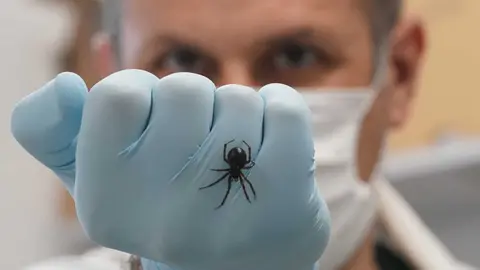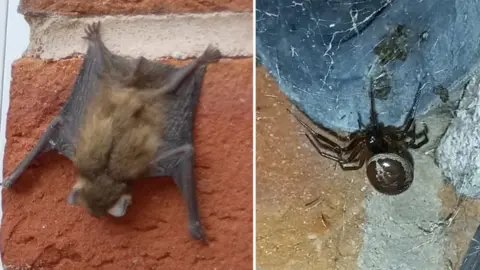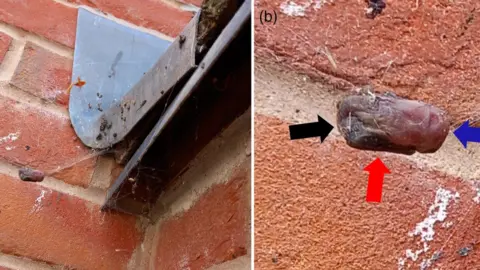Spider recorded preying on bat in Shropshire artist's attic
 NUI Galway
NUI GalwayAn artist discovered a spider preying on a bat in his attic in the first recorded instance of such behaviour.
Ben Waddams, from Loppington, in Shropshire, had been monitoring pipistrelle bats roosting in his house.
He said he had also shared his home with a noble false widow spider for a number of years and one day found a bat pup had fallen into its web.
He shared his findings with academics in Ireland who said it was the first record of the species preying on bats.
Mr Waddams said he first became aware of the tiny bats after hearing squeaks coming from upstairs.
"There were a lot of bats up there," he said.
"Coincidentally I was also well aware for a few years of this false widow spider, and quite a large one at that."
 Ben Waddams
Ben WaddamsMr Waddams said the spider was about the size of "a fat pea" and had built a web around his chimney breast.
"I started checking every morning every evening, just to check what was going on, and then one morning I found a dead pup in this false widow spider's web.
"It had been partially wrapped in silk and it was shrunken up, so it appeared that it had been preyed upon."
A second adult pipistrelle bat - a protected species in the UK - also became entangled, however Mr Waddams was able to rescue it.
 Ben Waddams
Ben WaddamsHe posted online about what had happened and was contacted by Dr John Dunbar from the National University of Ireland in Galway.

Factfile: Noble false widow spiders
Native to Madeira and the Canary Islands, noble false widow spiders were first recorded in the UK in the 1870s, thought to have arrived as stowaways on cargo ships.
They can grow up to 11mm (0.4 inches) in length and are fairly common across the country, particularly in southern counties.
The spiders are so called due to their resemblance to black widow spiders, and while they can bite, unlike their cousins they are relatively harmless.

Dr Dunbar went on to publish a paper this week which found this family of spider species had never before been recorded preying on bats anywhere in the world.
"In more exotic parts of the world, scientists have been documenting such predation events by spiders on small vertebrates for many years, but we are only beginning to realise just how common these events occur," Dr Dunbar said.
"Now that this alien species has become well established in Ireland and Britain, we are witnessing such fascinating events on our very own doorstep."

Follow BBC West Midlands on Facebook, Twitter and Instagram. Send your story ideas to: [email protected]
